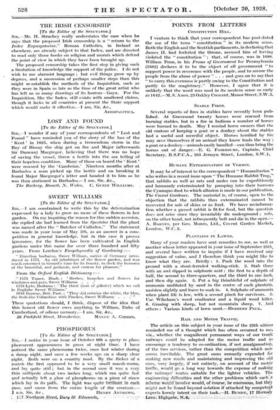POINTS FROM LETTERS
CoNsTrruriorc HILL.
I venture to think that your correspondent has post-dated the use of the term " constitution " in its modern sense. Both the English and the Scottish parliaments, in declaring that James _II. had forfeited the throne, accused him of having violated the " constitution " ; that, of course, was in 1688. William Penn, in his Frame of Government for Pennsylvania (1682) declares it to be the object of all government " to support power in reverence with the people, and to secure the people from the abuse of power " . . . and goes on to say that " to carry this evenness is partly owing to the Constitution and partly to the magistracy." However, I agree that it is unlikely that the word was used in its modern sense so early as 1642:—M. S.Amos, 25 Oakley Crescent, Manor Street, S.W. 3.
STABLE FIRES.
Several reports of fires in stables have recently been pub- lished. At Gravesend twenty horses were rescued from burning stables, but in a fire in Indiana a number of horses were burned to death. May I remind horse owners that the old custont of keeping a goat or a donkey about the stables had a useful and merciful object. Horses terrified by fire may save themselves if an animal they know leads the way-; a goat ora donkey—animals easily handled—can thus bring the horses out of danger.—E. G. FAIRHOLME, Captain, Chiel Secretary, R.S.P.C.A.,. 105 Jermyn Street, London, S.W.1.
• - . .
HUMANE EXTERMINATION OF VERMIN.
. It may be of interest to the correspondent " Humanitarian " who writes in a recent issue upon " The Humane Rabbit Trap," that rabbits as well as rats and moles can be expeditiously and humanely exterminated by pumping into their burrows the Cyanogas dust to which allusion is made in our publication, The CoUnt Gardener. The material is, of course, open to the objection tlat the rabbits thus exterminated cannot be recovered for sale of skins or as food. We have no informa- tion whether a gassed rabbit is fit for food, but the question does not arise since they invariably die underground ; rats, on the other hand, not infrequently bolt and die in the open.= A. BARNES, per Geo. Munro, Ltd., Covent Garden Market, London, W.C. 2.
PLANTAINS IN LAWNS.
Many of your readers have sent remedies to me, as well as another whose letter appeared in your issue of September 29th, and several have written to inquire if I have received any suggestion of value, and I therefore think you might like to know what they are. Briefly : 1. Push the weed into the ground with a stout-ferruled walking-stick. 2. Stab three with an awl dipped in sulphuric acid : the first to a depth of half, the second to three-quarters, and the third to one inch, and then dip again. 3. Put a big thimbleful of sulphate of ammonia undiluted by sand in the centre of each plantain, moisten slightly and leave to soak in. 4. Sulphate of ammonia when plant life is low, with a second pinch for survivors. 5. Use Wikeham's weed eradicator and a liquid weed killer. 6. Grazing with sheep, but not mountain sheep. 7. And others : Various kinds of lawn sand.—HERBERT Pncx.
RAIL AND MOTOR TRAFFIC.
The article on this subject in your issue of the 25th ultimo reminded me of a thought which has often occurred to me, viz., whether the magnificent permanent ways of our trunk railways could be adapted for the motor traffic and io encourage a tendency to co-ordination, if not amalgamation, of the two services, rather than the competition which now seems inevitable. The great sums annually expended for making new roads and maintaining and improving the old ones, very largely, if not entirely, on account of the motor traffic, would go a long way towards the expense of making the railways' routes suitable for the lighter vehicles. The engineering difficulties and the other problems which suchla
icheme wou/dinvOlve would, of course; be enormous, but they might not be found beyond solution if attacked by compete0 experts keenly intent on their task.—H. BUNDY, 17 Honisey
Lane. Highgate, -






























































 Previous page
Previous page